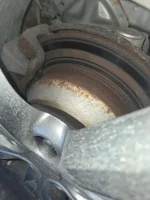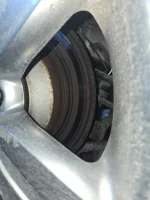Hello. I have a 2012 Kia Sorento. Occasionally, I hear a high pitched squealing noise as I drive. It usually only happens when driving straight at very low speeds, but sometimes I can hear it even at 40 mph. It seems to stop when I turn the wheel left or right, and when I brake. It can start again once I take my foot off the brake. I don't hear it every time I drive, so it randomly occurs. I attached a video with sound of the noise here
Any idea what it could be?
I originally thought it might be the brakes, but I currently have about 38k miles on this set. I had two previous sets of brakes with this vehicle. The first set lasted 66k miles, and the second set lasted 53k miles. It just passed state inspection last week without issue. So I'm thinking the brakes should be good based on my driving history. Perhaps something in the suspension needs to be lubed? Any thoughts would be greatly appreciated. Thank you.
This is a great description of a very common and frustrating issue. The high-pitched squealing that stops when you turn or brake is a classic symptom of a brake-related problem, even if your brake pads seem to have a lot of life left.
Based on the information you provided, here's a breakdown of what could be causing the noise and why it's behaving the way it is:
1. Brake Pad "Wear Indicators"
Many modern brake pads have a small metal tab called a "wear indicator" or "squealer." When the pad wears down to a certain point (typically with about ⅛” – ¼” of material left), this tab makes contact with the rotor, creating a high-pitched squeal to warn you that the pads need to be replaced.
- Why it fits your symptoms: The noise can be intermittent, as the tab may not always be touching the rotor, especially when the vehicle is moving straight and the pads are not under a lot of pressure. When you apply the brakes, the pad makes full contact with the rotor, which can stop the squeal. When you turn, the wheel angle can slightly change the contact point and also make the noise stop.
- Why it might be the issue despite your mileage: Your previous brake sets lasted a long time. However, this could be a sign that this particular set of pads is made of a different material, or that your driving habits have changed slightly. Also, even with 38k miles, the wear on the front and rear brakes can be different, so one may be close to the wear indicator while the other has plenty of life left.
2. Lack of Lubrication or Glazed Rotors/Pads
Brake squeal can also be caused by a lack of lubrication on the brake caliper slide pins or the back of the brake pads. When these parts aren't lubricated properly, they can vibrate against each other, causing a squeal.
- Why it fits your symptoms: This noise can be intermittent and can go away when you apply the brakes because the pad is firmly pressed against the rotor, stopping the vibration. It might also be present at low speeds when vibrations are more prominent and cease at higher speeds or when you turn the wheel.
- Glazed surfaces: If the brake pads or rotors have been overheated, they can develop a hard, shiny surface known as "glazing." This can cause a persistent squeal.
3. Brake Backing Plate or Other Related Components
A less common but possible cause is a loose or bent brake backing plate. This thin metal shield sits behind the brake rotor to protect it. It's possible that a rock or debris could have gotten wedged between the plate and the rotor, or that the plate itself has become loose.
- Why it fits your symptoms: The squeal would be a high-pitched scraping or squealing noise. It might stop when you brake or turn because the forces on the wheel and braking system shift just enough to move the parts apart.
Next Steps and Recommendations
1. Don't Dismiss the Brakes: Even though you passed inspection and have good mileage on your pads, you should not rule out the brakes. The fact that the noise stops when you brake and turn the wheel is a strong indication that the issue is coming from that system.
2. Visual Inspection: Take a good look at your brake pads. If you can, check the inner pads, not just the outer ones, as they often wear faster. Look for a wear indicator tab scraping the rotor. Also, check for any signs of a warped rotor (uneven wear or blue spots from heat) or a loose backing plate.
3. Professional Diagnosis: The best course of action is to have a mechanic listen to the noise in person. They can often tell the source of the sound from the pitch and location. They can also get the vehicle on a lift to perform a more thorough inspection of the brakes, including lubricating the caliper pins and backing plates.
Based on your description, it's very unlikely to be a suspension issue that needs lubrication, as a suspension squeak would typically occur over bumps or when the suspension compresses, not necessarily with these specific speed and braking conditions. The evidence strongly points to the braking system.


